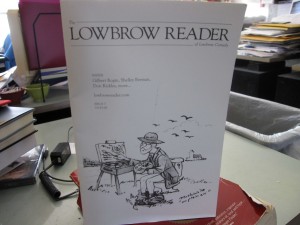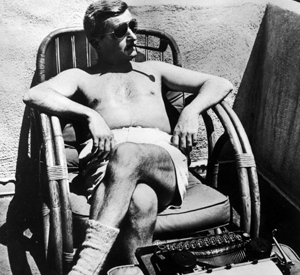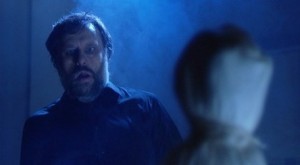Lowbrow Reader #7: Gilbert Rogin

Did you know that the imense bones of Orestes, the discovery of which Herodotus relates, are now believed to be those of a prehistoric monster? Of course, the inference is not that Orestes had undergone a metamorphosis in his lifetime, one that was revealed from an examination of his remains; it is rather that the prevalent cult of heroic relics required outsized bones, and conveniently, those of great, lumbering Pleistocene beasts popped up from time to time. More persuasively, it was the other way round, as it often is, the uncovering of the bones leading to the formation of the cult.
But suppose the bones were Orestes’, that he became aware that he was in the grip of a terrible transformation, and that he was unhinged. Could that explain everything that followed? Something to think about early in the morning when your dad’s ghostly, fluent fingers seem to be accompanying the rain.
Who is Gilbert Rogin, exactly? His books are out of print, but he has had 33 stories published in the New Yorker over the years, was once complimented by Joyce Carol Oates in the Partisan Review, likened (in print) to Bruno Schulz by Updike and for years was managing editor of Sports Illustrated.
What?
Later this week I will ask LR editor Jay Ruttenberg how he rediscovered this crotchety literary gem, met up with him and then got Rogin to write in his modest publication. It’s a funny story.
Get your copy of the new Lowbrow Reader here.
Rumpus “Long Interview with Dave Eggers”
 Seriously, that’s what it’s called and that’s what it is. Stephen’s talking to Dave about the latter’s new nonfiction book, Zeitoun. Here’s a taste. Click anywhere to get the full serving.
Seriously, that’s what it’s called and that’s what it is. Stephen’s talking to Dave about the latter’s new nonfiction book, Zeitoun. Here’s a taste. Click anywhere to get the full serving.
John Dermot Woods’s The Complete Collection of people, places & things
I just ordered this: so too should you: John Dermot Woods’s The Complete Collection of people, places & things, which is surely to be wholly wonderful and grand.
PRE-ORDER SPECIAL!
Order The Complete Collection of people, places & things by July 15 and get it for only $12 (25% off the cover price) with free shipping in the U.S.
EXTRA STUFF FOR THE FIRST 50 PEOPLE WHO ORDER:
– A signed/numbered screen print, commemorating the book’s release
-personalized copy with a limited edition, signed book plate
(be sure to specify your shipping address)
The Complete Collection of people, places & things
a novel by John Dermot Woods
BlazeVOX Books 2009
ISBN: 9781935402466
175 pp. Perfect Bound. With Drawings.
GIANT GUEST-POST: Poetry as Site of Resistance by Jeremy Schmall

Poetry as Site of Resistance
by Jeremy Schmall
If you’re willing to argue with me when I say that nearly every poetry book published in the last 30 years is an abject failure, it’s likely you’re among the small group of people across the country who consider themselves poets. For everyone else, poetry simply doesn’t exist outside of high school textbooks. Poets do not appear on talk shows, do not perform on late night TV, and it’s increasingly unlikely their books will be reviewed in prominent publications like The New York Times or the Washington Post. It’s common knowledge in the publishing industry that even the rare “blockbuster” poetry books sell laughably small numbers compared with verifiable “failures” in the fiction and memoir world. In almost every measure we use to gauge success—money earned, books sold, widespread popular relevance, public recognition—poetry today is an absolute failure. My argument is that’s a good thing.
Pimp Faulkner
 William Faulkner was a pretty serious guy, and his answers to an interview with The Paris Review in 1956 reflects a severe staunchness and didacticism that, as an enormous fan, I can only afford him. He brought cerebral European modernism to America and rolled it around in dirt. Here’s my favorite reply of his:
William Faulkner was a pretty serious guy, and his answers to an interview with The Paris Review in 1956 reflects a severe staunchness and didacticism that, as an enormous fan, I can only afford him. He brought cerebral European modernism to America and rolled it around in dirt. Here’s my favorite reply of his:
PARIS REVIEW: Then what would be the best environment for a writer?
WILLIAM FAULKNER: […] If you mean me, the best job that was ever offered to me was to become a landlord in a brothel. In my opinion it’s the perfect milieu for an artist to work in. It gives him perfect economic freedom; he’s free of fear and hunger; he has a roof over his head and nothing whatever to do except keep a few simple accounts and to go once every month and pay off the local police. The place is quiet during the morning hours, which is the best time of the day to work. There’s enough social life in the evening, if he wishes to participate, to keep him from being bored; it gives him a certain standing in his society; he has nothing to do because the madam keeps the books; all the inmates of the house are females and would defer to him and call him “sir.” All the bootleggers in the neighborhood would call him “sir.” And he could call the police by their first names.
It’s so perfectly hilarious it seems sarcastic, or even a satire, but in the context of the entire hyper-rational interview, he’s simply following his logic. I love the way he says “social life in the evening” unabashedly with a straight face. It’s official, ‘Faulkner as pimp’ edges out ‘Kafka as clerk’ as my all-time-high mental image/ideal of a writer. The next time I orgasm I’m gonna cough out Yoknapatawpha! and have a flashback to a previous chapter. Bill, my man, slap that ass.
Getting to Know Furry Girl & Feminisnt
Susie Bright was plugging this on her facebook yesterday, and it popped up in the feed on my page, and it seemed pretty neat. This is all NSFW, so caveat whatever. …
Another long interview (this time with Žižek brain, Adam Kotsko)

Haha, he looks funny
When Adam Kotsko’s book Žižek and Theology was published about a year ago, he was still working on his PhD at Chicago Theological Seminary. It’s an impressive feat and an impressive book. Certainly there are better introductions to Žižek’s thought than Adam’s book, which takes as its starting point the issue of where Žižek aligns with theology — duh — but I still found it to be a valuable crash course. (Does anyone else find it useful to approach a new subject from a specific perspective, and then apply what you know about that perspective to the subject? I risk conflating the two things when I do it this way, but wtf: I’m okay with being wrong.) READ MORE >
Derek White’s Marsupial Art Giveaway
Derek White is giving away a piece of the art from his novel Marsupial, on the occasion of its one year anniversary in print.
If you haven’t seen Derek’s art, shit, it’s pretty wild and beautiful and amalgamatic:


